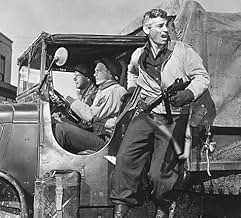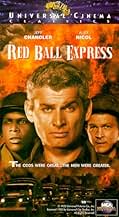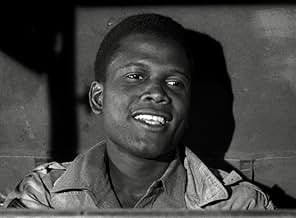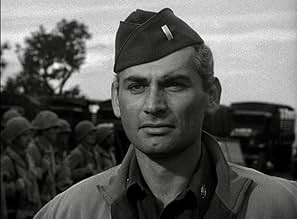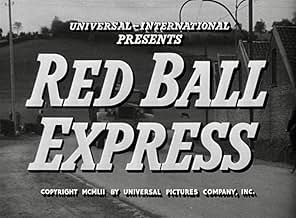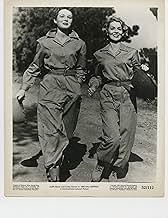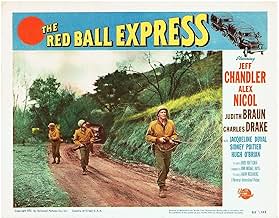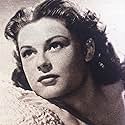Story of the military truck drivers who kept the Allied armies supplied in Europe during World War II.Story of the military truck drivers who kept the Allied armies supplied in Europe during World War II.Story of the military truck drivers who kept the Allied armies supplied in Europe during World War II.
- Director
- Writers
- Stars
Davis Roberts
- Pvt. Dave McCord
- (as Robert Davis)
Gregg Palmer
- Tank Lieutenant
- (as Palmer Lee)
Douglas Bank
- Mechanic
- (uncredited)
George Barrows
- Soldier in Bistro
- (uncredited)
Nan Boardman
- French Peasant Mother
- (uncredited)
- Director
- Writers
- All cast & crew
- Production, box office & more at IMDbPro
Featured reviews
It's a sad commentary that before the Armed Services were integrated post World War II by President Truman, the Red Ball Express was one of the few that black American soldiers could fully participate in and that one was relatively behind the lines.
Jeff Chandler plays the steely eyed commander of this bunch of formerly civilian truck drivers now chosen as a unit to supply Patton's advancing army with needed fuel. Among the cast is a young Sidney Poitier as one of the drivers. They may have been behind the lines, but the picture clearly shows their participation in the war wasn't an easy street.
Chandler's job is to weld this disparate bunch into a unit and he succeeds despite a lot of racial tension. The cast performs admirably in this picture.
One of the great stories of World War II was the rapid advance across France of Patton's army after the breakout from the Normandy beachhead. He could have never done it without the heroic efforts of the men depicted in this movie. It was Ike's and Patton's secret weapon and this picture an admirable tribute to them.
Jeff Chandler plays the steely eyed commander of this bunch of formerly civilian truck drivers now chosen as a unit to supply Patton's advancing army with needed fuel. Among the cast is a young Sidney Poitier as one of the drivers. They may have been behind the lines, but the picture clearly shows their participation in the war wasn't an easy street.
Chandler's job is to weld this disparate bunch into a unit and he succeeds despite a lot of racial tension. The cast performs admirably in this picture.
One of the great stories of World War II was the rapid advance across France of Patton's army after the breakout from the Normandy beachhead. He could have never done it without the heroic efforts of the men depicted in this movie. It was Ike's and Patton's secret weapon and this picture an admirable tribute to them.
There is more to war than just the glory boys; 95% of the GIs in WW 2 (and all other wars) are never in the limelight as heroes, but they did more than their fair share of sacrifice. My father was one of those guys. He landed at Normandy, was with the infantry marching to the Hurtgen Forest, and getting overrun in the Battle of the Bulge. He was there for it all. He might not have been a hero in those battles (he was always looking for dry socks), but he was a hero to me. He and thousands of others, such as the men in The Red Ball Express, doing thankless jobs and sacrificing a lot more than just a few days lost sleep. Try driving 30 hours without sleep sometime. An underrated film, very similar to The Sorcerer, and the French film, Wages of Fear, but a bit more traditional. Good viewing.
In Red Ball Express, a group of soldiers whose job isn't normally featured in movies gets center stage. War pictures are usually about the daring Marines or the sailors who are desperate for a taste of the action, not the folks assigned to the boring jobs. These men are the truck drivers who deliver supplies to the fellows featured in the other movies. It's an interesting angle, and if you do find that aspect of the war intriguing, you'll probably like it.
Jeff Chandler stars as the head of the platoon, and of course (since there has to be some drama in a movie that doesn't scream 'drama') he clashes with the other men. Alex Nicol holds a grudge because his brother was killed in a battle involving Jeff. There are also some testy scenes involving Sidney Poitier and the white soldiers who begrudge being assigned to an integrated unit. I've seen much more riveting war movies in my day, but if it sounds interesting to you, give it a shot and see what you think.
Jeff Chandler stars as the head of the platoon, and of course (since there has to be some drama in a movie that doesn't scream 'drama') he clashes with the other men. Alex Nicol holds a grudge because his brother was killed in a battle involving Jeff. There are also some testy scenes involving Sidney Poitier and the white soldiers who begrudge being assigned to an integrated unit. I've seen much more riveting war movies in my day, but if it sounds interesting to you, give it a shot and see what you think.
This is not my favourite from Budd Boetticher, not his best either, just a common war flick, but speaking of something rather important for US Army just after D Day for logistics matters, because all the French railway nets were destroyed. It had to be told about, I guess not other film did it. That said the cast is OK, with a convincing Jeff Chandler but not as good as in MERRIL'S MARAUDERS for instance. The real Red Ball Express took many Black soldiers who could not fight in regular troops because of racial segregation in US Army during this period. Yes, this story had to be told, but I guess many things, details have been changed from reality.
The setup, in case you don't already know it, is this. The troops of the western Allies were bottle necked in Normandy, France, for the first month or so after the D-Day landings. The armies finally broke through the German defenses and Gen. George Patton's Third Army rapidly advanced across central and northern France. So rapidly that they outpaced their supply lines. The U.S. Army put together a truck convoy system to keep Patton's forces supplied and named it the Red Ball Express. Aside from managing to keep up with Patton's advance, the outfit is also noted for being one of the few integrated units in the U.S. armed forces at the time--I use the term "integrated" somewhat guardedly, since that usually meant white senior officers leading black junior officers and enlisted men, which is not what would first come to my mind as "integrated." Regardless, around 75% of the servicemen in the Red Ball Express were African Americans.
You wouldn't know that from this movie, where the ratio seems to have been reversed. However, I'm willing to give the filmmakers some credit for at least trying to address the integration issue at the time when they were working rather than castigate them for not doing what we might expect a present-moment filmmaker to do. That's not the real problem with this movie as a movie. Acting is not the problem with this movie, either, as another reviewer suggested. The acting is workmanlike--neither outstanding nor poor, just efficient. No, the weakness of this movie is that it is simply another cliché-ridden war movie; blame not the messengers, but rather the script. First, there is the clichéd unit. Our two lead characters have a troubled past and, surprise surprise, are forced to work together in the same outfit ("of all the gin joints in all the towns . .."). The unit has a romantic, it has a "runt" of the litter with glasses, it has a stolid misunderstood commander, it has a guy clearly from Brooklyn, and so forth. Just like any other war movie of the day (think of, say, "Air Force" or "Guadalcanal Diary"). What's new here for the time is that the filmmakers exchanged African Americans for some of the other stereotypical roster of "average Americans" you got in any war movie. Notably, there are NO characters who are clearly supposed to be white Southerners--an omission that itself speaks volumes about how sensitive race relations were in the early 1950s in the U.S. and especially in the then-recently desegregated U.S. armed forces.
The clichéd unit is indicative of the rest of the flick. You've seen this movie before. Bunch of misfits forced to work together overcome their differences and become a cohesive fighting unit--well, except here I never really got the sense we were watching an outfit of misfits. Yes, there's the guy with the racial issue vs. Sidney Poitier, and yes, there's the lead characters with the troubled past--one of whom is the main stumbling block that's keeping this outfit from fully coming together (what's that you say? That setup sounds like "Flying Tigers"? no wait, "Sands of Iwo Jima"? no, wait . . .)--but the movie is in too much of hurry to get this outfit on the road to really *show* how this outfit becomes a team. Essentially it just is. What else, you ask? How about the sweet-talking American and the saucy French girl? Rivalry with another outfit, with other outfit finally recognizing our heroes are indeed Heroes? The guys who think there mission is going to be a cakewalk only to discover the Harsh Reality Of War? Etc., etc.
Oh, the movie is solid enough and hits all the standard points--some action, some down time, some roughhousing, a romantic moment or two, some grousing, some "let's pull together" time--and some of the cast members are likable enough that, all told, you won't feel like you wasted your time watching this one. However, aside from the then-timely touch of trying to show an integrated outfit there's nothing here to see you haven't seen before.
You wouldn't know that from this movie, where the ratio seems to have been reversed. However, I'm willing to give the filmmakers some credit for at least trying to address the integration issue at the time when they were working rather than castigate them for not doing what we might expect a present-moment filmmaker to do. That's not the real problem with this movie as a movie. Acting is not the problem with this movie, either, as another reviewer suggested. The acting is workmanlike--neither outstanding nor poor, just efficient. No, the weakness of this movie is that it is simply another cliché-ridden war movie; blame not the messengers, but rather the script. First, there is the clichéd unit. Our two lead characters have a troubled past and, surprise surprise, are forced to work together in the same outfit ("of all the gin joints in all the towns . .."). The unit has a romantic, it has a "runt" of the litter with glasses, it has a stolid misunderstood commander, it has a guy clearly from Brooklyn, and so forth. Just like any other war movie of the day (think of, say, "Air Force" or "Guadalcanal Diary"). What's new here for the time is that the filmmakers exchanged African Americans for some of the other stereotypical roster of "average Americans" you got in any war movie. Notably, there are NO characters who are clearly supposed to be white Southerners--an omission that itself speaks volumes about how sensitive race relations were in the early 1950s in the U.S. and especially in the then-recently desegregated U.S. armed forces.
The clichéd unit is indicative of the rest of the flick. You've seen this movie before. Bunch of misfits forced to work together overcome their differences and become a cohesive fighting unit--well, except here I never really got the sense we were watching an outfit of misfits. Yes, there's the guy with the racial issue vs. Sidney Poitier, and yes, there's the lead characters with the troubled past--one of whom is the main stumbling block that's keeping this outfit from fully coming together (what's that you say? That setup sounds like "Flying Tigers"? no wait, "Sands of Iwo Jima"? no, wait . . .)--but the movie is in too much of hurry to get this outfit on the road to really *show* how this outfit becomes a team. Essentially it just is. What else, you ask? How about the sweet-talking American and the saucy French girl? Rivalry with another outfit, with other outfit finally recognizing our heroes are indeed Heroes? The guys who think there mission is going to be a cakewalk only to discover the Harsh Reality Of War? Etc., etc.
Oh, the movie is solid enough and hits all the standard points--some action, some down time, some roughhousing, a romantic moment or two, some grousing, some "let's pull together" time--and some of the cast members are likable enough that, all told, you won't feel like you wasted your time watching this one. However, aside from the then-timely touch of trying to show an integrated outfit there's nothing here to see you haven't seen before.
Did you know
- TriviaLouis L'Amour's memoir, "Education of a Wandering Man", said this movie was actually based on his own war-time anecdotes. He was awarded two Bronze Star Medals while serving as an officer with the Red Ball Express.
- GoofsThe real Red Ball Express operated two separate roads for traffic (one going to the front and one for returning empty) Two-way traffic on a single road, as shown in the film , never occurred.
- Crazy creditsNo credits besides the title, seven minutes in the film.
- ConnectionsFeatured in Budd Boetticher: A Man Can Do That (2005)
- How long is Red Ball Express?Powered by Alexa
Details
- Runtime
- 1h 23m(83 min)
- Color
- Aspect ratio
- 1.37 : 1
Contribute to this page
Suggest an edit or add missing content

